Ty-D-Bol Man Drops Anchor
Actor Dan Resin, whose authoritative, no-nonsense approach to his craft lent a substantial amount of credibility to his most challenging role-that of yachtsman condemned by shadowy forces he could not comprehend to spend the rest of his days motoring around a commode and advocating for environmental improvements therein-has died at the age of 79. He also played Dr. Beeper in Caddyshack. It would probably be too easy to end on a line like, “Resin will be buried at sea,” but when else am I going to get that chance? He was the freakin’ Ty-D-Bol man, for God’s sake, we will not see his like again. Anyway. Resin will be buried at sea.
Seven Years as a Freelance Writer, or, How To Make Vitamin Soup
by Richard Morgan
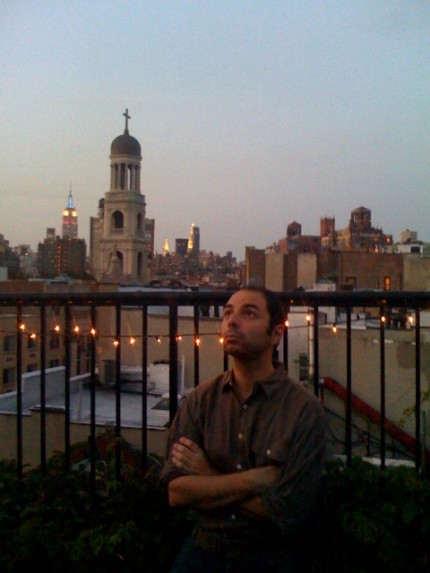
People like my resume — here’s a PDF! But a resume is only the skin of a career. And, even then, it’s skin with a lot of make-up on it. People live their lives, knowing the interior of their existence, and can only compare it to the exteriors of the lives of others — so, as a public service, here’s a look at the interior of my seven years as a freelancer. That is to say, seven years as one of the choosiest beggars imaginable. The Devil does not wear Prada. The Devil wears Times New Roman. Or Arial Narrow. And he shows up in my inbox every hour on the hour. And the Devil is sneaky. He gets deputy editors to send me emails that read, in full: “Hey there. Got an idea for you. Any interest in writing a James Franco profile?”
In 2003, at my mother’s house in Apex, Nawf Carlana, I read a Mediabistro panel discussion that described Chris Napolitano, then the front-of-the-book editor at Playboy, as the only editor in Manhattan who still answered his phone. I took this literally. So I dialed 411: “New York, New York, please. Playboy Magazine, please. Chris Napolitano, please.”
I pitched him over the phone. He gave me the green light and hung up. I sat there happy beyond belief, but also totally confused by this editor — as I would be confused by many, many editors still to come — because he had not told me how many words to submit, or given me a deadline, or mentioned pay. I called again and left a voicemail. He called back. My mother answered. Her: “Richard, Playboy’s on the phone for you.” Me: “I got it, Mom! You can hang up now!” I drove 10 hours to New York, stayed overnight in Murray Hill with a high-school buddy, did my reporting and drove 10 hours back. I filed some very bad writing and mercifully got some very heavy-handed editing. And presto chango: “I’ve written for Playboy Magazine and other publications.” Unwisely, I had also pitched the same thing to Brian Farnham, then the front-of-the-book editor at Details, who green-lighted a quote for the opener there. I lost my New York media virginity in that accidental threeway with them.
Even before I attended the Graduate School of Journalism at Columbia University, I was writing features for Details that were being debated on “The O’Reilly Factor.” I wrote one of the rare freelanced cover stories for the New York Daily News — a school scandal I had pitched to the New York Times only to be told never ever to use the word “scandal” in my pitch (they ended up chasing the story the next day; it took two reporters to re-report my story). I went to the Turkish countryside to write about a 600-year-old Turkish olive-oil wrestling tournament for ESPN. I lived at a research station in the Alaskan Arctic for the Times. I went to Peru for National Geographic. I went to keggers at New York magazine and went to parties with Sigur Ros and the cast of “Saturday Night Live.” (Note: not the same party.) I was part of Topic, a genuinely cool-if-a-bit-precious “nonfiction literary journal” in Brooklyn. And I’m part of a new magazine, about videogame culture, called Kill Screen. Passion projects!
There’s a lot of good times in freelancing! I had a bet with a Times reporter about who could get the phrase “that’s how we roll, yo” in the paper without quotes; I won (though somewhat on a technicality), with an essay that, upon submission, got my editor to come over to me and give me an actual explicit compliment. I wrote about men in a wet T-shirt contest for the Wall Street Journal and got a gay male porn mention (with photo!) in Playboy. State attorneys general in California, Connecticut and New Jersey launched investigations into a shady business after I wrote a story about it in the Times. I wrote crazy opening sentences about boobies and gay Jews in a paper that prides itself on running “all the news that’s fit to print.” I was called “a great interviewer” by Dan Rather. I won awards. I was on television. There was just one day in all these seven years that I had an actual job, at Gawker; I quit after the first day, an event that ended up becoming good anecdote for someone else’s story in the Sunday Times. I get invited back to my journalism school to speak to the class about “how to be a successful freelancer” and “the art of freelancing.”
I once got paid $100 a word.
What’s more, I did this all from my $875-a-month-Craigslisted apartment in the West Village, where I’ve lived for the past five years, mostly spending my days watching television, napping, noshing, strolling around, seeing matinees, playing The Sims, having sex and getting intoxicated.
That sounds like success, right? It may or may not be. Decide after reading.
When people say they want to get into freelancing but don’t know how to do it, what I tell them is: OK, fine, you don’t know how to freelance because you’ve never done it before, but take something you do know how to do — dating — and just use the same rules. Freelancing is basically just courtship, but the freelancer-editor relationship is nothing more than friends with benefits. The editor likes you because you remind the editor of when she had enthusiasm and appetite and vision and so you make the editor feel powerful in the way that nostalgia empowers people.
But the editor will never choose you over the publication to which he is married. It will not even be a fleeting thought in the editor’s mind. The freelancer can have a lot of fun, but is ultimately the editor’s plaything. And any one freelancer is, above all things, unnecessary and replaceable. I always felt like the most fumbling juggling act in the industry.
Freelancing is an adventure the way “Locked Up Abroad” is an adventure. Journalism even at its best is already a fairly caustic and draining experience. All the qualities that make you a great journalist make you a terrible person: gossip, urgency, obsession, noisiness, theatrics and hysterics. I help anyone who asks for it. Just this past Friday, I got an email at 3:38 a.m. from a Pulitzer-winning friend who wanted my help with a New Yorker assignment; I called back at 3:39. I never wanted to be one of those broken, bitter people. Why would anyone want to lose friends and alienate people? I was particularly struck — and maybe scared — by a story a friend told me after he snagged a great job at Condé Nast. He talked about how he shared his apartment with a married couple and their cat, and that the couple was on vacation and there he was, in his bathroom, trying to take a dump, and this cat was lonely and pawing at the gap under the door, and all he could think is that he had this glamorous job at this stylish magazine and he couldn’t even manage a life where he could take a dump in peace. Maybe I was emboldened by that lucky cold call to Playboy, but I fought against the rulebook and tried a lot of crazy things that seemed to work.
After getting the runaround for a month, I sent balloons to an editor at Rolling Stone with a note: “This is cheaper than skywriting. Lemme know about my story.” When the Times asked me for writing samples, I sent them only a 3,000-word essay I had written about unrequited love with a straight guy. I sent a looooong note to a personal and professional hero, Adam Moss, wherein I compared him both to Big Bird and The Pope and quoted him to himself — no, really. An excerpt:
Without making you sound too regal or papal, I hope for an audience with you. I’m not stupid or naïve enough to be job-seeking. There is so much grabby noise in journalism — which is why it stood out to me so much when Michael Wolff wrote about you (in a New York profile before your reign) that you are “a mild man among bullies and screamers.” As a journalist, a thinker and a gay professional I respect your opinion a great deal. At a panel discussion at the Ethical Society, with Clay Felker in attendance, I was really impressed by the way you used the Finkel scandal as a teachable moment for both yourself and the audience. You can be rather heroic. Who doesn’t want to meet their hero? Once, when I was 5, I met Big Bird. He wasn’t so big in real life. But I was still glad to meet him. Grown-up to grown-up, I think I’d fare far better with you.
It ended up landing me an hour-long meeting that restored my faith in journalism and in myself but it also ingrained the difference between writers and editors. Heroes be damned; a writer should not model themselves after an editor. That is probably the single best realization I have made as a freelancer.
Moss said the thing that all editors inevitably tell all writers — something along the lines of “I really admire your determination, because I tried freelancing and didn’t last six months.” Editors like to talk about how much they need freelancers and how much they envy our freedom and our work ethic and our Rolodex. Whenever a friend loses his staff job at a magazine or newspaper, his ensuing panic reminds me that they put all their eggs in one basket and that I am cushioned because I have my eggs spread across so many baskets (which is a different kind of panic). Freelancing has great rewards, but trajectory is not really one of them. You do not go from being a freelance writer to a freelance editor to a freelance deputy managing editor. Essentially, I’m doing the same thing I was doing in 2003. The market for my vaudevillian sales of wonder tonic can dry up at any moment. An editor leaves. A magazine folds. And poof! Gone.
But the Sword of Damocles isn’t what’s most toxic to the freelance experience. What’s worst is that, in order to be a freelancer for very long, you have to think of yourself in certain ways. You know what they say about beautiful people? That every pretty girl or gorgeous man is someone’s ex, was too much hassle for someone. That’s definitely true of freelancing. You show up to the party with the Times or Playboy on your arm and people always, always, always think that you are the half of that relationship that is the lucky one. There are a lot of squinty glances. Really? What do they see in you? Are you rich or something? Hung? Family friends? Because it could never be the case that Beauty lucks out by being with the Beast unless the story ends with the Beast becoming beautiful too. It’s like Lena Horne said: “You have to be taught to be second-class.”
Freelancing requires such strict adherence to toadyism, to sycophancy, to the grubbiest, lowliest submissions. It is an on-spec life and it is full of what can only be described as insane serendipity (or serendipitous insanity). After the Giants won Super Bowl XLII, an editor at the Times’ then-existing Play magazine noticed that there were a lot of celebrities at the game and asked me if I would be interested in tracking down all of the celebrities involved, interviewing them for play-by-play analysis peppered with colorful scenes (maybe Kate Hudson got mustard on her dress! Maybe Will Smith missed seeing that great interception because he was in the bathroom!), and then combining all of these scraps into a 300-word meta-narrative-with a deadline of 24 hours to complete it. “Sure thing,” I said, because when an editor gives you an impossible assignment, it’s better to try and fail than to be the guy who didn’t even bother. Only Spike Lee got back to me, but I turned it into a fun story that the editors said they loved.
You make your own luck, though. In 2004, I had an interview for a gig at Fortune. I had $10.13 to my name. When I showed up for the interview, the editor paused and said “This is how you show up to an interview? You need a haircut. And your tie is dirty.” I explained that I only had enough money for either a Salvation Army tie or a haircut, and I had wagered on the value of a tie (even though I had selected a dirty brown polyester one).
Then he looked at my clips and said “Don’t you hate this part, when I’m pretending to read your work that I clearly haven’t read already?” I said, yes, actually, this part really sucks. Then he asked me, without looking at me, if I read Fortune. “No,” I said. “I’m young and poor. Why would I read Fortune?” The silence went on long enough that I got distracted by the thought that his office was bigger than my studio in Harlem. Then he laughed and said he liked honesty, and hired me. I went home to my empty studio-nothing but a suitcase, a towel, a laptop and a bundled-up jacket I used as a pillow when I slept on the floor — and laughed that I freelanced for Fortune. I was ballsy and I was defying the odds.
But last year, I had a very different experience.
I had heard there was a need for a staff blogger at Speakeasy, the culture blog at the Wall Street Journal. Technically, it was openly advertised on the Dow Jones career website, but, as is typical, the job offer was described there in the vaguest terms — “reporter” or “news assistant” or something. I had a crew of cheerleaders within the paper. I submitted a white paper laying out my take on things, including their requested analysis of 300-plus New York City-area blogs. I met with editor after editor, onward and upward, until I was in Robert Thomson’s office, answering his questions about an online video series I proposed called “Wasted Opportunities,” wherein I would get drunk with some noteworthy person the way they used to on, say, Dick Cavett’s talk show. He liked that, he said. He laughed (he has a great laugh) and I laughed too, even though I was wearing a very conventional navy suit with a blue-and-red striped tie and had gotten a haircut where I told the stylist “I need to look like I work at the Wall Street Journal.”
But what really sticks out about that meeting with Thomson is the moment just beforehand, when I was idly chatting with his assistant, trying to get some clues to help me brave the lion’s den — I was nervous, having learned to be nervous — when my eye caught a piece of paper on her desk. It was a printout of a Talk of the Town from the New Yorker. I recognized the accompanying illustration. “Oh, you have this? My friend Steve wrote that,” I said.
“Oh, really?” she said. “How weird! He’s also applying for the job. It’s down to you two and another person.”
Five days earlier, Steve had been on the roof of my apartment, at my 30th birthday party, wishing me well on my Journal prospects. When Steve got the story in the New Yorker, I called him that Monday morning to congratulate him and then took him out to a steak dinner. Steve was a kind of kindred spirit at that time. We met each other at the Times, where we were both regular writers for the all-freelanced, now-defunct City section of the paper. And we knew some of the same people at Details and Entertainment Weekly and GQ and New York. But, more to the point — at least for me — he was from small-town Pennsylvania and knew what it meant to have made it to New York, to have made it into the Times newsroom without any of that Harvard-Yale-Princeton so-and-so fancypants muckety-muck background.
And so I had naturally confided in him that I was going for this job, and I had laid out my strategy and divulged all the reconnaissance I had gathered, seeking his advice and guidance. And he used that all against me, to go for the job himself — and, in fact, he got it and still works there.
I texted him after I left my meeting with Thomson: “you and I are two of the three finalists. good company to keep.”
He replied, in full: “who is the third person?”
That’s what freelancing is: not just to believe that your station in life demands gratitude that an editor deigns to respond to you, let alone engage you intellectually and creatively, but also that clips and contacts and especially actual paying, salaried-with-benefits-and-corporate-email jobs must necessarily curdle you (which you always tell yourself is more about being professional and mature and responsible) into being a creature not unlike Gollum from Lord of the Rings. If clips are precious treasures, all the more for proper jobs.
Freelancing is pitching two ideas to a new editor at the Times, after having written for the publication for five years, and being told (quoting exactly here): “I think you’d have better luck pitching your stories elsewhere.”
It’s paying your own way to Boston after securing an interview with a famous, millionaire recluse, only to have the story live in limbo until the day you read the latest issue of the publication and see, oh!, they have a feature about the very phenomenon you were writing about — which means, at least, that your editor hadn’t mentioned your story to anybody.
Freelancing means walking from the West Village to the Upper East Side and back because you don’t have enough money for the subway. Freelancing means being so poor and so hungry for so long that you “eat” a bowl of soup that’s just hot water, crushed-up multivitamins and half your spice rack (mostly garlic salt).
Freelancing is being woken up on a Monday at 8 a.m. by an editor who gives you the following assignment: “Put together everything interesting about all the city’s airports by Friday,” doing it, and then not getting credit when it runs… as an infographic.
Freelancing is having your mother send you a book called $ix-Figure Freelancing which lists as helpful resources, on page 198, the dictionary, thesaurus and sree.net.
Freelancing means your editor will reject your pitch and then, seven month later, run the story you pitched — with the same language as your pitch — and then have it submitted for a National Magazine Award.
Freelancing is having an editor tell you that he really loves the story you’ve filed and wouldn’t change anything, and in fact suggests you expand upon the characters a bit — and also cut the story in half. Because, in an editor’s world, it’s possible to expand upon characters and not change the structure while you also cut the story in half.
Freelancing means having to chase down checks every time, even when that means waiting two years for $1000. It means having stories killed and being told that the editor-in-chief gave no reason, but that the same editor would love to work with you some more.
Freelancing is that remarkable stretch from February to December 2009, where I wrote entire features… using only my phone, a first-generation iPhone jailbroken for T-mobile, bought for $100 from a friend at Mac Week. That was because my computer had broken and I couldn’t afford a replacement.
The most confusing experience in my seven years at this singing-for-supper routine is a contest between two instances. I pitched a Talk of the Town to the New Yorker that was dismissed as “a bit too ready-made for Talk” — which was true, because it ran the next week, written by a staffer. The other was the time I pitched the New York Observer and was rejected, only to be contacted three weeks later: “It turns out that your idea is a good idea after all.”
But the best case for how incomprehensible the whole system can be of course comes out of what is routinely called the best magazine currently in existence: New York.
I once pitched an Encounter to New York and the editor got back to me with probably the most-condescending email of my career, and that even includes the time the New Yorker told me that my Shouts & Murmurs submission was “good, but not great.”
Here it is. The punctuation is original:
I think what you should focus on, since you’re not really settled in here as a writer yet, is news value: not a celeb, or someone like curtis who we’ve been discussing for some time, but someone and something that isnt pie in the sky but isnt obvious either — and that you can get.
Sorry to put such a high bar on this, but even with the pizza thing you havent really proven yourself here yet. You need to get a reputation for getting things done, clearly and cleanly and accurately, which, if you put your mind to it, you’re capable of, I’m sure.
I know freelancing is difficult. Ive done it, and in better times than these. But in this day and age, there are also fewer pages to fill. So its tough. So you have to be a pro.
Anyway, I ended up running the story with a different editor at New York on the website. When that blog post ran, a third staffer at the magazine emailed me asking how I had secured access to the celebrity, who he said they had been trying to land for an Encounter for the past few months.
Huh.
Even if you can navigate the interpersonal vagaries, there is the added obstacle of payment. The New York Times’ Sports section pays a flat fee of $200 per article, which is about 25 cents a word. The Washington Post Style section has a ceiling of 2,000 words and $350, which is about 17 cents a word. That Alaskan jaunt for the Times? I financed it with a fellowship. That ESPN Turkish adventure? They only covered my expenses after the fact; it was a $1,300 gamble on my part. People blame the recession. Or the business model. Or consumers’ sense of entitlement about free information. Or the editors themselves. (While writing this, I IM’d with Choire Sicha, my Awl editor, for guidance and called him — jokingly! — a “lazy bitch,” to which he replied “TRUTH. All the editors are the same.”) Being a freelancer today is like being a single parent. I’m the father. And the mother. And, for as long as you’ll believe it, I’m Santa Claus. At some point, it becomes unclear what exactly it is that editors do. And one cannot conceive of a world where writers treat editors the way editors treat writers, although I once made an attempt:
hi editor,
i’m excited to work with you on any innovative new projects you’re planning. specifically, i’m looking to be involved in something that takes public data that nobody else has noticed and lays out a broad, complicated, everyday, powerfully subtle truth relating to shocking, poignant human dramas. something intellectual and breezy with a real red-meat statistical core that’s garnished with fun, topical pop culture references. something that brings ordinary people’s deepest private fears and anxieties and taboos into sharp relief in a way they feel comfortable sharing and being photographed for — but also something i can infuse with celebrities’ and other power players’ candid, vulnerable, insightful epiphanies that i’d like to draw out of 20-minute phone conversations. so… ideally, i’d like to do this at $1/word in about 300 or 400 words, not including captions for the online slideshow or any part of the audio and video supplements i’ll put together as well. i’d only need a week or so to file this.
thanks again for this opportunity. i’m looking forward to hearing from you soon.
best,
writer
Freelancing isn’t just about finding good stories. It is also — more so? — about finding good editors. I have solid relationships with four, which, over a seven-year span, works out to encountering one good editor for every 21 months. Maybe I sound as silly and vain and vacuous as Jessica Simpson talking about her very real struggle with acne and how Pro-Activ Solution helped her, but journalism is built upon the values of truth and transparency and intellectual service and candor — of sunshine being the best disinfectant.
And now I live in Memphis, covering higher education, science, health and technology for The Commercial Appeal — a daily newspaper since 1839 (even when the Civil War made the editors publish on the run from Union troops! And even when the Yellow Fever epidemic of 1878 reduced the staff to two!). I get to shake off my umbrella at reception and say “Helluva morning out there, Lois!” A nerd-dream fulfilled! Not only all that, but in a newsroom built as the set of a fake Washington Post for the 2008 thriller Nothing But The Truth!
Even here, though, I was bumbling. My cover letter, written while watching “Glee,” included gems like “I’m too sour to bother googling it” and “I’m not cool” and ended with me writing about when I cried over butterscotch milkshakes. When they flew me in for an interview and asked me about any skills I had, I flaunted a trick wherein my middle fingers appear to be connected through my palms. The editor said “That’s not the kind of skill I meant.” To which I said: “Well, can you do it?” He could not. I got the job. I’m actually part of a wave of hires there; they also snagged the Washington Post’s religion editor and a court reporter from the Atlanta Journal-Constitution. I’m still allowed to freelance, but there’s less need now.
My feelings about it are best expressed by a mentor’s thoughts that he shared when I went to him for advice about the job offer: “I’m excited, Richard, because it’s not covering courts or cops or city councils or school boards. It’s not stenography or racing to slap content onto a blog. Someone is trusting you to be the guy who covers intelligence and innovation. They are valuing you at your actual value, at the value you know you have and that I know you have. All the assignments you’ve taken at the fancy newspapers and fancy magazines, they’ve always come to you with the sense that you should be grateful and that you still have lots of dues to pay. This is the first time I’ve heard you describe a boss who recognizes that you’ve paid your dues and deserve a reward. And, Richard, this is a hell of a reward.” Finally.
Richard Morgan previously wrote for The Awl about black athletes who do not play basketball. Today is Richard’s 31st birthday, so think about that before you contact him with your thoughts about this story.
Love Clive Owen? And Catherine Keener? Well, Bad News!
Yup, it’s Trust… the new David Schwimmer movie.
Freddie Gibbs, "National Anthem (F*** The World)"
It would pretty cool if the new Freddie Gibbs song really was the national anthem. (More appropriate during the previous administration, I suppose. Also: idea for rap name: Francis Scott “Ki.”) It’s a good one. While I’m still waiting for the refreshingly understated Gary, Indiana rapper to knock my socks off with an instantly addictive beat or a great hook or something, his voice is terrific, and so’s his flow-I love the way he switches tempo here. And he seems to be more honestly committed to realism than most people who’d tell you they keep it real. Like the end of this video. How often do you see a rapper depicted as losing in his own video? And not in a blaze of glory, but rather just as like, a bummer.
32 Greatest Recorded Performances of Johann Sebastian Bach's Goldberg Variations
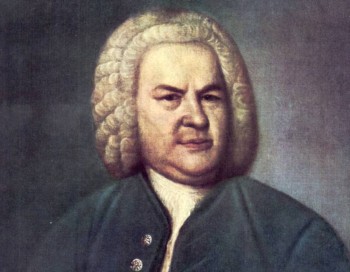
32. Micallef-Inanga Piano Duo (Holloway arrangement for two pianos)
31. Pius Cheung (Cheung marimba arrangement)
30. Konstantin Lifschitz
29. Rosalyn Tureck (1994)
28. Jean Guillou (Guillou organ transcription)
27. Jacques Loussier Trio (Loussier jazz transcription)
26. Trevor Pinnock
25. Wilhelm Kempff
24. Homecoming Woodwind Ensemble (Eshpai woodwind arrangement)
23. Kenneth Gilbert
22. Gustav Leonhardt (1983)
21. Dong Hyek Lim
20. Chen Pi-hsien
19. Angela Hewitt
18. Canadian Brass (Frankenpohl brass arrangement)
17. Kurt Rodarmer (Rodarmer guitar transcription)
16. John Kamitsuka
15. András Schiff (2001)
14. Dmitry Sitkovetsky / Gérard Caussé / Misha Maisky (Sitkovetsky transcription)
13. Marcus Becker
12. NES Chamber Orchestra (Sitkovetsky transcription)
11. Simone Dinnerstein
10. Glenn Gould (1959, Salzburg)
9. Tatiana Nikolayeva
8. Céline Frisch
7. Wanda Landowska (1933)
6. Murray Perahia
5. Andre Vieru
4. Nodar Gabunia
3. Ton Koopman
2. Glenn Gould (1982)
1. Glenn Gould (1955)
The Most-Stolen Books At McNally Jackson
by Nate Freeman
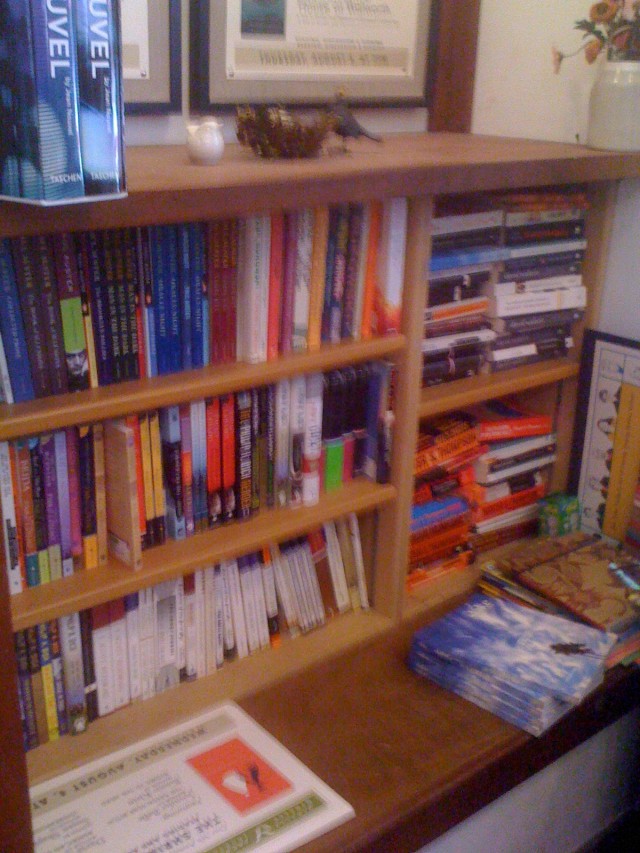
For some customers of delightful Prince Street bookstore McNally Jackson, the 20% discount on offer in July just wasn’t enough. Some customers would just rather steal. Turns out, there’s a certain subset of literature that really brings out the sticky fingers in people. When the staff discovered which books were being slipped into backpacks and satchels with the most regularity, they moved these titles to a protected section behind the counter. Books on lockdown! So-here are the books all the kids are stealing these days!
- Paul Auster, “New York Trilogy” and others. (“I never thought Paul Auster was five-finger discount stuff,” said Brook Stephenson, a bookseller.)
- Bukowski, “Tales of Ordinary Madness,” “Ham on Rye.”
- Hunter S. Thompson, “Fear and Loathing on the Campaign Trail,” “Hell’s Angels.”
- Paulo Coelho, “The Alchemist.”
- F. Scott Fitzgerald, “The Great Gatsby” and all the others.
- Various Hemingway, including “A Moveable Feast” and “The Sun Also Rises.”
- David Sedaris, “Naked,” “Me Talk Pretty One Day.” (“Yeah, I don’t understand that one,” Stephenson said. “David Sedaris? Really?”)
- Jack Kerouac, “On The Road.” (“With the beatnik writers they want the beatnik price,” Stephenson said.)
Bookseller Yvette Grant told me Don DeLillo used to be back there, too, but he was moved to the shelves because of “space issues.” She mentioned, however, that there have been no incidents of people trying to steal his books since they’ve gone unprotected. You’re losing your edge, Don!
The culprits of these literary heists don’t risk returning to the bookstore. “We have a list [of people who have been caught]-it’s over ten,” Stephenson said. “We have mug shots of them, a wall of shame.”
But really-what kind of soulless creature would steal a book? “You might find students, you might find adults,” Grant said.
“It might be a couple with a baby and a stroller!” Stephenson said. “I’m serious!”
Stephenson walked to the shelf and un-wedged a paperback from the row. “And these aren’t expensive books,” he said, flipping on to its back. “For Whom The Bell Tolls? This is 16 bucks! C’mon-are you serious?”
Carlos Solis, another bookseller, crouched down to examine the titles. Most of them fall squarely in the canon of books that have become a cliché to read.
“It also means kids are fairly unimaginative,” he said.
The Machines Try To Kill Prison Island Family
“The first lesson is not to always believe your Navman and to have a look at a decent road map before you leave travelling to somewhere you’ve never been. And the second one is to never travel on the dirt roads in the west of NSW or western Queensland, particularly after heavy rainfall and when there’s clear signs saying the roads are closed.”
-An Australian policeman creates a teachable moment from the story of a family of four who spent four days trapped in the mud after ignoring road closure signs in favor of the advice of their GPS.
Scenes From An American Oil Spill
by Suzannah Evans
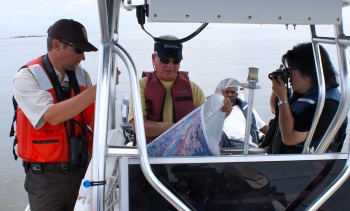
A few weeks ago, I was on a boat in Barataria Bay off Louisiana’s Grand Isle, touring mangrove islands encircled by orange and white booms. The mangroves brimmed with roosting pelicans with their cottonball chicks and roseate spoonbills turned from pink to beige by a thin film of oil. A local Fox field reporter asked if she could see an oiled bird rescue-the avatars of the crisis. But the breeding colony didn’t have birds that were oily enough for removal, so the Fish and Wildlife Service was just taking media out on motorboats for an educational tour.
One of my boatmates was Alan S. Chin, an experienced photojournalist whose work in Kosovo earned him Pulitzer nominations in 1999 and 2000. Since then, he’s been embedded in Iraq and Afghanistan multiple times, but he told me that photographing the oil disaster has been one of the most difficult jobs he’d ever done. In conflict, there are immediate visual stories with blood and shoes and twisted metal. The creeping oil spill has been more evasive.
There have been a few memorable images: the Jerry Bruckheimer-esque burning rig, the grainy spillcam and the oiled pelicans, which started cropping up in photos a full six weeks after the Deepwater Horizon exploded, providing a gut-punch visual that seemed to finally define the crisis. But unlike the Exxon Valdez spill, in a finite area with a finite amount of oil conveniently located on the surface and near the shore, the scale of the Gulf disaster is difficult to convey. The changes are in the chemistry of the water. The livelihoods of the people who live on the Gulf will slip away as quietly as the tide.
I called Chin up after our on-the-water meeting, and he agreed to share some of his images with the Awl and talk about the unique challenges of depicting the disaster. As the media storyline tips toward talk of the “disappearing” oil slick, he emphasized the less perceptible effects of the disaster that even his experienced lens struggled to capture.
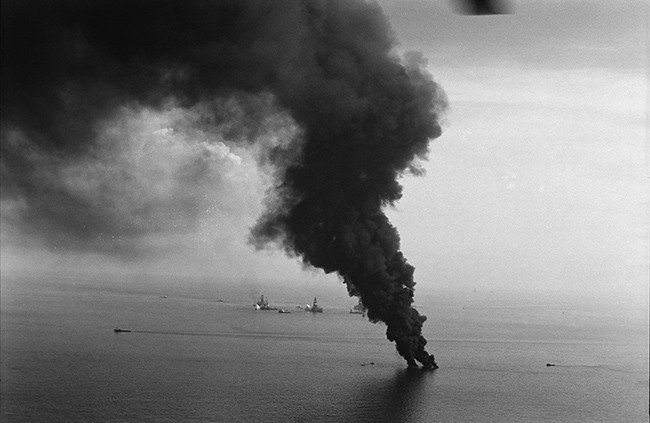
Oil is burned off from the Deepwater Horizon site. [ALAN CHIN/facingchange.org]
“I had covered New Orleans and the surrounding region since Hurricane Katrina. I went down there for Mardi Gras, and it was really the first time in four years I had gone to New Orleans, not to photograph the after-effects of Katrina but really just to see my friends and to have a good time. It was really the first time in all these years that it felt like the city was back to a real city with a real life. The Saints had just won the Super Bowl, and there was a good feeling in town. And I really finally felt that my project, which I want to publish as a book on New Orleans, Louisiana and Mississippi during and after Katrina, was finished. So I’m feeling good about it, and two weeks later, the shit hits the fan again with this oil spill. And then I felt, well, how do you photograph this? It’s just the most important breaking news story in this country right now and you know that it’s not going to be a fast one; this wasn’t a one-day story, or even a one-week or one-month story.”

At the Deepwater Horizon spill site. [ALAN CHIN/facingchange.org]
“This is something that’s going to go on for months and the aftereffects are going to go on for years, even decades. So how do you get at something like this? And of course we saw those pictures of the pelicans covered with oil. You can spend time with fishermen and shrimpers, and other people who live on the coast, or even the people who work in the oil industry, whose lives are going to be affected, they’re going to lose income, they’re going to lose their tradition, they’re going to lose their livelihood, you can do all that. You can do what we did on the boat and helicopter, you can try to look at the actual thing itself in terms of ‘Okay, here’s the oil. Here’s the oil on fire.’”
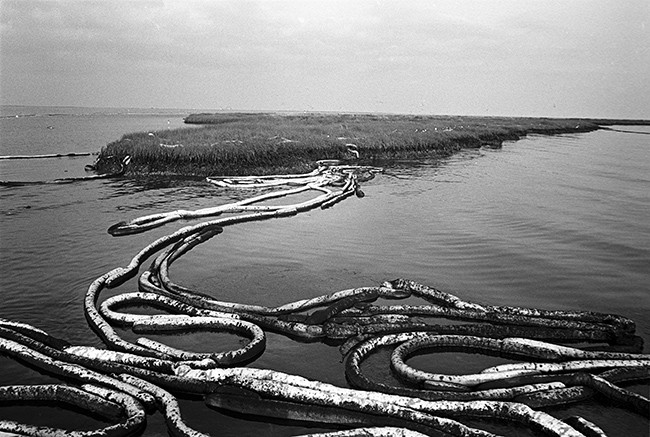
Absorbent booms tangled up near Grand Isle, La. [ALAN CHIN/facingchange.org]
“And here’s the booms trying to protect these islands, which to me-I didn’t really want to say it in front of those Coast Guard and Fish and Wildlife guys-but to me, it really felt like putting a condom on a fire hydrant. It’s theater.”
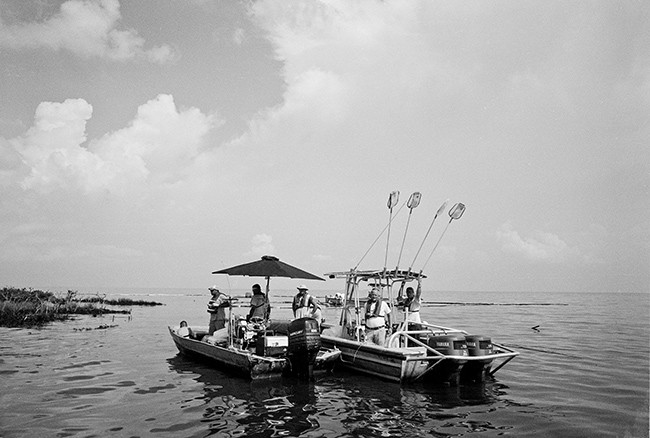
A bird rescue crew checks out one of the breeding mangroves. [ALAN CHIN/facingchange.org]
“But even with documenting all of that, I don’t think any of it really gets the heart of this story, because what makes this oil spill bad, ultimately, isn’t that some birds got covered in oil and died, isn’t that the coastline gets screwed up for a while. The oil is bad because of what it is. It’s a chemical. When you photograph a war, or a catastrophe like Katrina, the damage is evident. Buildings burn. Bodies are in the streets. We know exactly what the impact of this is, right? The levee breaks and a whole neighborhood is wiped out. And you can see it. “
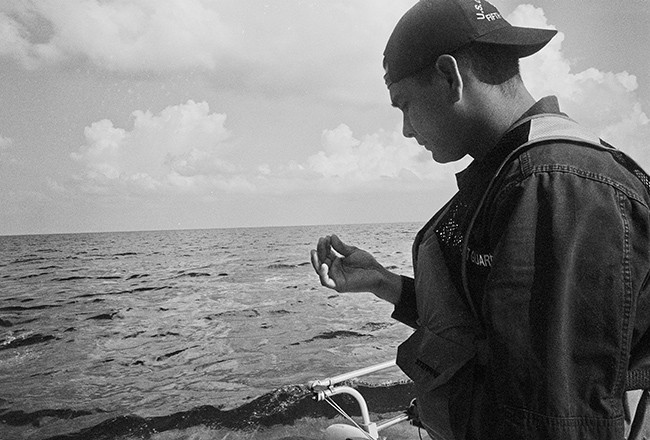
A Coast Guard member. [ALAN CHIN/facingchange.org]
“I think with the oil spill we can see effect, but the true cause, the actual, biological and physical and scientific reason, is not easy to see. In fact, it’s impossible to see.”
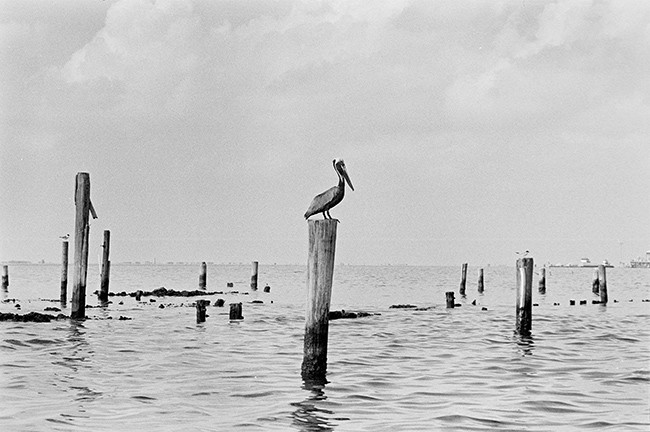
Pelican, Grand Isle, La. [ALAN CHIN/facingchange.org]
“I could take a pelican, and I could dip him in chocolate, and it would look the same. I don’t think we can really get at the heart of just how awful it is and how much of an impact this will have.”
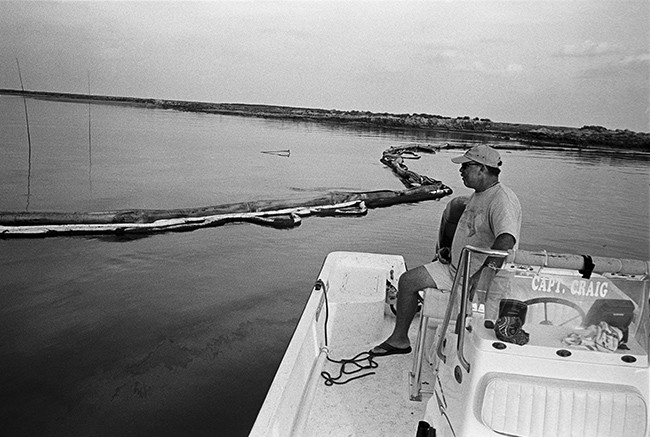
The more vital wildlife areas are protected by “soft” absorbent white booms as well as “hard” orange inflatable booms. [ALAN CHIN/facingchange.org]
“I feel that the limitations to access are a little bit subtle, too. Like, for example, the day we went out on that boat. They were happy to show us certain things. But, you know, they were not going to take us to the worst-affected areas.”
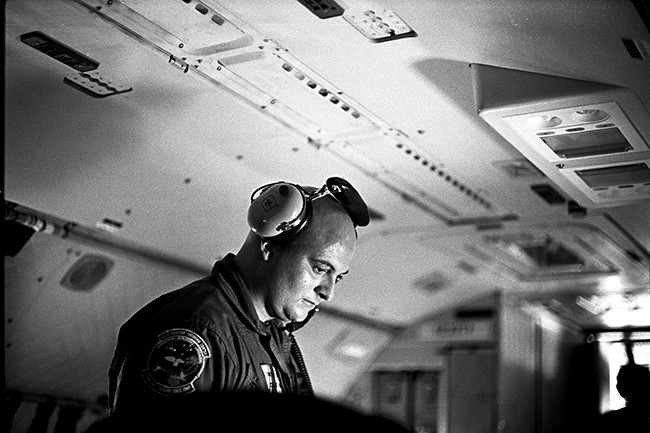
Coast Guard air crew on board aircraft flying over the spill site. [ALAN CHIN/facingchange.org]
“I’ve been in Iraq two times, I was in Afghanistan three times, I covered the Balkan wars in Bosnia, also Israel/Palestine. [The oil disaster is] very different. When you cover conflict, everything, in a way, is easy. It’s horrible, and it’s criminal, but it’s visible, right? Here, it’s slow, and it’s almost invisible except for maybe these couple telling things. This is really a narrative story of long term. It’s going to be 10 years or 20 years. It may be 60 years.”
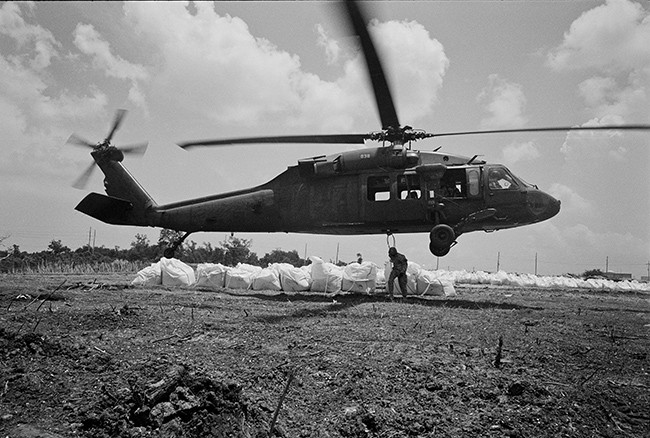
National Guard helicopters drop 3000-lb. sandbags to build up an artificial berm. [ALAN CHIN/facingchange.org]
“As long as we’re a great power, these things are going to happen. Because we’re still going to pursue oil drilling even if we do it in a much more responsible way. We’re still going to get involved in foreign wars, we’re still going to have natural disasters like Katrina. I’m a member of the semi-mainstream media, or maybe not so mainstream, I don’t even know what that means-I think we’re actually doing our jobs. I think the problem is reaching the audience. Not that people aren’t doing the right reporting and the right photography and filming and so on. I think we are. I think we’re out there and we are covering these stories and with some intelligence and sensitivity. The problem is getting it out into the world in a way that is effective and that is where I don’t know how to answer that question.”
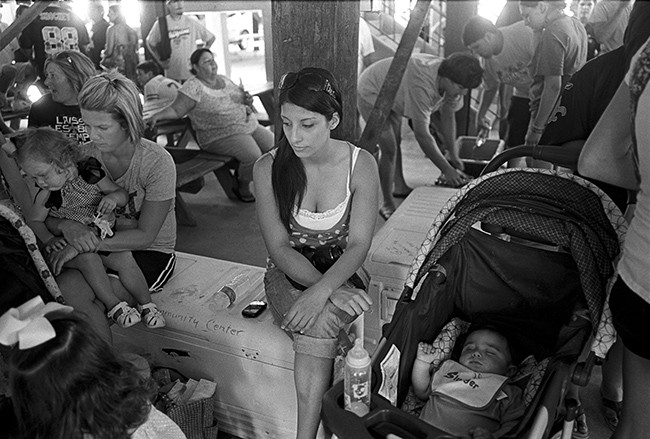
Residents waiting for New Orleans Saints players as part of a morale-boosting event in Grand Isle, La., which was devastated by the spill. [ALAN CHIN/facingchange.org]
“There’s this other project called ‘Facing Change: Documenting America’ which is a group of us, a collective of photographers who have formed a nonprofit. We were inspired by what the Farm Security Administration they did in the 1930s, like the Dorothy Lange picture of the migrant mother. Those were the iconic images of the Great Depression. We live in a very different media world and a different society than they did in the 1930s, but we aspire to that kind of project. We think it’s extremely important to create a historical record of this time because-for all the reasons I’ve just been talking about-I think the time we’re living in now is as critical as what this nation went through in the ‘30s. Maybe it’s not a Great Depression, but it’s damn critical.”
Alan S. Chin has covered conflicts in Iraq, the ex-Yugoslavia, Afghanistan, Central Asia, and the Middle East. His work has twice been nominated for the Pulitzer Prize.
Suzannah Evans is an editor for a nonprofit in Washington, D.C. She recently resurrected her Tumblr after a three-year hiatus.
Mitch Miller, 1911-2010
“Mr. Miller was the Midas of novelty music, storming the charts with records like Jimmy Boyd’s ‘I Saw Mommy Kissing Santa Claus’…”
-You’d think someone as old as the hugely successful oboist, bandleader, producer and TV-show host Mitch Miller was maybe holding out for the century mark. But apparently, he just wanted to see one of his signature hits play over the closing credits of Mad Men. (I’m assuming he got to see an advance of Sunday’s episode before he died Saturday.)
The Question That Confronts Every New Yorker Eventually
“I saw a woman weeping on the subway and I did nothing. Was that the appropriate response?” The answers may surprise etc.
